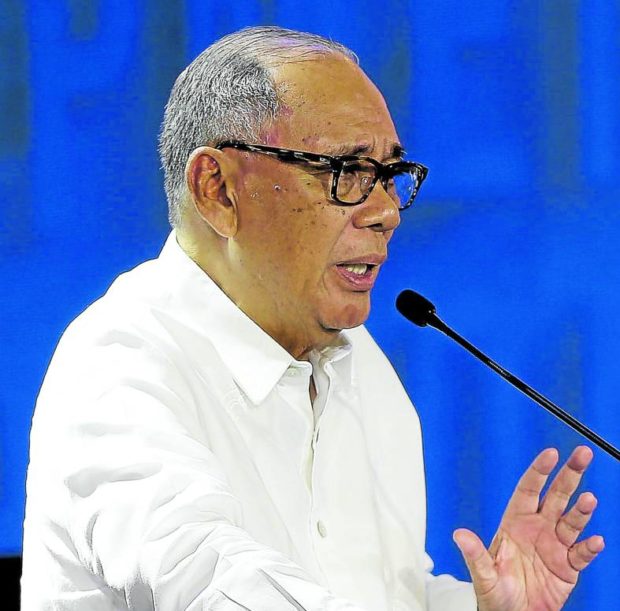Abella: Former Duterte spox hopes his own pitch goes far

Ernesto Abella (File photo by RICHARD A. REYES / Philippine Daily Inquirer)
[The Inquirer starts a series on how the presidential campaign has revealed or transformed the candidates in the public eye as they woo the Filipino voter. We begin in alphabetical order with Ernesto Abella.]
Ernesto Abella, 72, entered the national scene with an unenviable task.
As the first spokesperson of President Rodrigo Duterte, he was constantly called upon during Malacañang media briefings to explain, clarify and defend his principal’s controversial remarks, even to soften the pointed edges — all in a sober tone.
Now that he aspires to succeed his former boss, in the process going up against bigger names in politics, the former agribusiness executive, university professor, newspaper columnist, and evangelist, as well as kidnapping victim, has been presenting a candid, ready-to-engage version of that initial public image.
Abella offers himself as a presidential candidate unblemished by allegations of wrongdoing or ineptitude, and whose ideas deserve to be heard if only he is given a few more minutes. He usually sums up his agenda by centering on three priorities: alleviating poverty, ending the “neglect” of farmers, especially in Mindanao, and restoring the people’s trust in government.
‘Where I’m coming from’
As Mr. Duterte’s mouthpiece from June 2016 to October 2017, Abella said, he had to be careful and “guarded” in the service of his principal who is known for off-the-cuff and expletive-laden spiels.
“In other words, I was always watchful with my representation [of the president], that I won’t misrepresent him. I was rather careful,” he recalled in an interview with the Inquirer.
“Right now, I know where I am coming from. I am much more comfortable, although I was also comfortable that time [in Malacañang],” he said.
One could say certain restraints are gone now. Yet the hurdles remain for someone like Abella, whose entry — and Commission on Elections-approved admission — into the presidential race as an independent candidate was generally met with surprise, if not suspicion, given his past ties to the administration.
In a field of 10 contenders, in terms of campaign resources, Abella tends to be grouped together with three others — Norberto Gonzales, Faisal Mangondato, and Jose Montemayor Jr.
Lacking the machinery to hit the road on nationwide sorties, they have mostly been wooing voters online or through participation in forums and interviews with the mainstream media.
Holding his own
But in the course of the campaign period, Abella has tried to hold his own, maximizing the mileage he could get while keeping a calm, practiced, and business-like demeanor.
Apart from his visioning statements and platform discourses, certain points in his life story have been highlighted.
Before entering the government service, he managed two agribusiness companies: AZ Agri-Products and F&P Agri-Inputs.
He completed a pre-med course at Ateneo de Davao University and earned a master’s degree in biblical studies from Silliman University. He’s also an alumnus of the Asian Institute of Management, finishing a master’s course in entrepreneurship. He taught courses at Ateneo and wrote a column in SunStar Davao and San Pedro Express.
Before his involvement in agribusiness, according to his resumé, he founded two charismatic-Christian groups: Hope of Asia and Jesus Fellowship Inc.
It was during his days as a pastor, in 1996, that he was abducted by “people who claimed to be MILF (Moro Islamic Liberation Front) but were mainly tribal bandits” operating in Davao City. The mayor at the time, Rodrigo Duterte, secured his release within 24 hours. Some members of the Moro Nationalist Liberation Front, the other (and older) separatist movement in Mindanao, also helped in the negotiations, Abella said.
After just over a year as Palace spokesperson, Abella was replaced by Harry Roque and moved to the Department of Foreign Affairs as undersecretary for strategic communications and research.
It was his last government post before making a stab at the presidency.
From 0 to 0.1 percent
Abella conceded to being among the underdogs in the presidential race, with the latest Pulse Asia survey showing him scoring 0.1 percent from 0 percent in March. Still, he said, he would be counting on voters looking for “fresh perspectives” in governance.
The words “reboot” and “alternative” often recur during his pitch, whenever he is asked why Filipinos should listen to him.
“I believe my advantage is that I know how to listen before crafting policies and laws, to make sure that those who are in need will be catered to. Not just sticking to political plans, but [focusing on] the needs of the people as well,” he told the Inquirer.
“We are delayed with this reboot because of how we handle governance. The people were somehow discouraged, because [of] corruption. These people feel that there’s no hope, but I see that there is still hope,” he said.
Among his specific plans is the establishment of an agency to be named “Board of Agricultural Investments,” to better deal with the challenges of food security and job creation in the farming sector.
But when the Inquirer urged him to elaborate on what he described as the eroding public trust in government, Abella was quick to raise a qualifier, saying he was not referring to the Duterte administration.
“What I am saying is that people were discouraged, not with this administration, but the past administrations. It’s proven by the fact that many people are leaving [the country]. Now, many are returning, hoping and believing in the administration of [Duterte] since they are connecting with him in many ways,” Abella said.
In this candidate’s view, the people’s needs have been “addressed” under Mr. Duterte’s leadership because they consider him to be “one of them.”
It may have been unintentional, but that sounded like the Abella of his Malacañang days.
RELATED STORIES
Presidential bet Abella to make PH agriculture a mega-industry, ‘activate’ civil society
Prexy bet Abella pushes for use of unspent Bayanihan 2 loan funds for food security